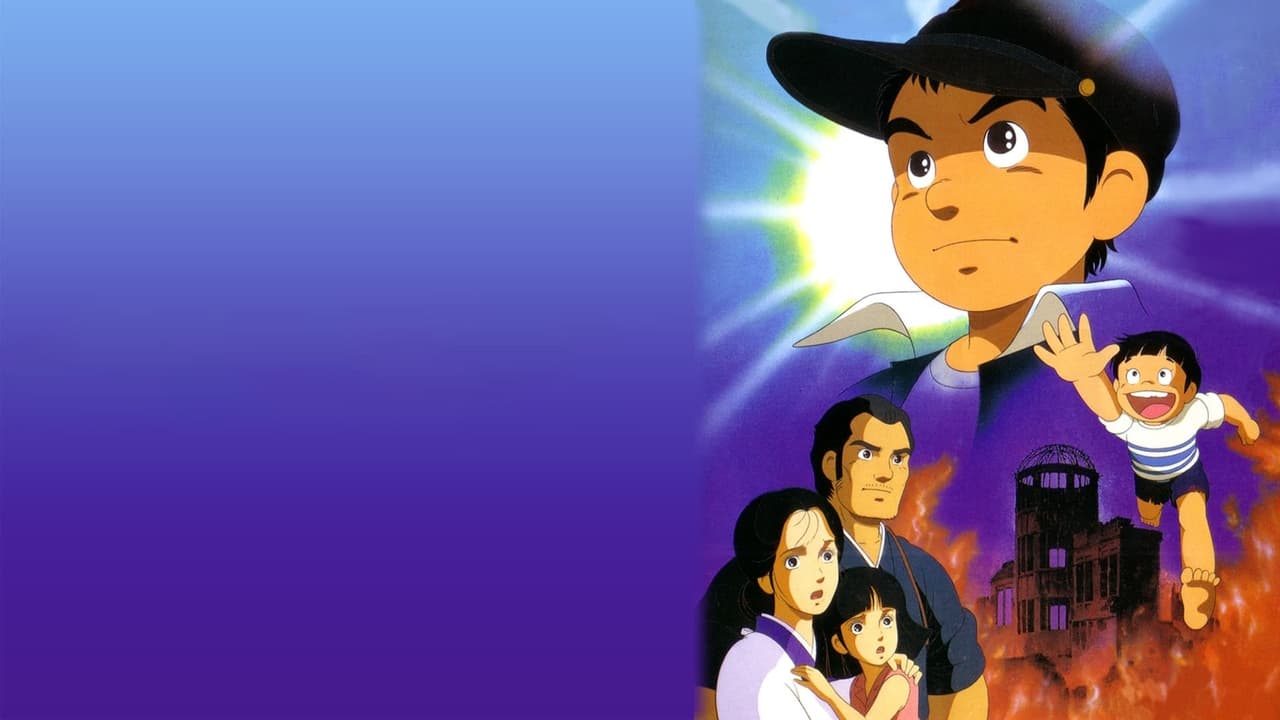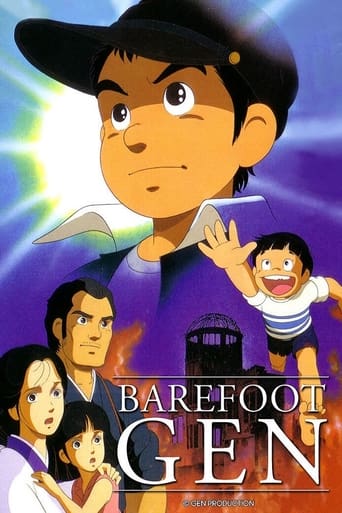

You won't be disappointed!
... View MoreA Brilliant Conflict
... View MoreFanciful, disturbing, and wildly original, it announces the arrival of a fresh, bold voice in American cinema.
... View MoreLet me be very fair here, this is not the best movie in my opinion. But, this movie is fun, it has purpose and is very enjoyable to watch.
... View MoreI read the Manga before seeing this movie, so I was kind of had some high standards to the film, but haven't yet saw the live version of Barefoot Gen Part 1 (1976), Barefoot Gen: Explosion of Tears (1977), Barefoot Gen: Part 3 Battle of Hiroshima (1980). So this animated film, is the first one I had seems since reading the manga. I wasn't disappointed. The film shows the madness of war, and it's just as heartbreaking, disturbing, and yet at the same time, it's so inspiring and uplifting by the actions of Barefoot Gen who is trying to make what best for his family. Barefoot Gen proves that even in the most dired and bleak of moments, a ray of hope can shine brightly. It shows that even a cartoon can show depth and cover one of the worst events in World History. The main different between the movie, and the book is the cutting of characters and more of the backstory before the bomb. In the book, the family are treated as traitors when his father is against the war forcing Gen's older brother to join the Navy to prove that his family isn't a coward. There is also a sum story between another family relation living in the county. Mr. Pak also has a bigger part. The story reveals the life of young Barefoot Gen surviving the horrors of Hiroshima, and it's an emotional driven story that would probably scare younger viewers. Most of the film, deals with his relationship with his mother, and his younger brother Shinji. I like the subbed version over the dubbed version when the dub is annoying, and when all the music has been changed. This isn't one of those movies. The English dubbed version is just as watchable as the sub version. The movie tends to be really, really depressing, there are parts in the movies that are just down right heart breaking. so this isn't a movie worth watching on family night but a movie worth to be teach in history class rooms about the dangers of nuclear weapon. In this film, you will feel every person's pain after the bombing. You can see the sadness, the pain, and what real death is. Most other movies make death too cliché and dramatic. But, in this movie, it shows what real death is. That is what makes this movie powerful in it's images.
... View MoreI will admit that I did not like the style of animation that was going on, but the characters were so charming that I wanted to see what happened next. I knew already that this movie was about the Hiroshima bombing, but when they showed the bombing in action, it was so tragic, I teared up and felt so sad for the women, the men, and especially the children and babies that had to endure such suffering. It is quite detailed, it shocked me as to how detailed it was considering the animation. The deaths of the father, daughter, and youngest son was also very tragic and shocking. You'd think "they're not going to die, they're going to live and somehow find a way to survive all this" - but sadly this was not the case. The mother's reaction to their deaths seemed quite realistic and disturbing, but she was able to snap out of it for her son's sake. The birth of the daughter was sweet and brought back a smile on my face, making me think "there it is, the hope we all want to see" but her death too was very sad and tragic. The movie isn't too long, but the amount of time spent with Gen makes you like him more and more throughout the film.This movie is very much recommended for those who are interested in the Hiroshima bombing and the aftermath. This is not a kids film.
... View MoreI've read the comic books of barefoot gen when i was in the elementary school. My teacher had the whole series of it, and i was really horrified when i first read it, but i was very curious and was into it after all. When I saw the movie, I liked the comic book better, but still it describes the horror of the war. I watched this movie with my grand parents who was in Hiroshima at that time, who really experienced it, said this movie describes it so well. hopefully I think anyone would experience this sad incident again, but it is really important to get an idea of what had happened in the real world. this movie is the best way i know to get a sense of it.
... View MoreIf, for one reason or another you only saw the first half of this film (before the bomb), you'd be highly confused as to why people are being so complimentary of it. It's humour is almost embarrassing to watch, the events seem to come in blocks, one after another, and as much as I hate to use the word: corny is the predominant feeling.However, when the bomb falls, you'll see why the filmmakers opted for this approach. The contrast between the two parts of the film is extreme. The sickeningly happy garden-gnome like sense of the first half is instantly and shockingly shattered by the truly horrific and sobering atmosphere of the second. Tears are to be fully expected as the results of the attack reveal themselves, again, accurately, in the blocky way they had in the first half, and truly excellently directed to its purpose.The focus of the movie is always on the suffering of the people, the sadness of the results of the 'Pika bomb', the consequence of war. It doesn't blame anyone and doesn't attempt to inspire patriotism, instead it only displays the cost of the decisions taken by the various political big shots on both sides, so ignorant to the true results of their choices. Certainly an important lesson today.Why people feel they need to state their personal opinions on the war and the bomb in the other reviews is not clear and not appropriate, however it is testament to the effect this film has on the viewer. Even the most right wing of audiences would struggle to resist the peace sentiment after seeing Barefoot Gen.Just as a note though, to those here who have said they don't feel sorry for the Japanese regarding the atomic bomb, bear in mind that it was the political and military leaders that led the war effort, that made the decisions, and that ordered the atrocities. The people that suffered from the atomic bomb, as is the nature of war, were the civilians, those who had no influence whatsoever over the action of their country - and indeed, as does Gen's father in the film, many of them believed Japan was making a mistake. Regardless of political position, age, sex and physical fitness, the terrible suffering was inflicted on many thousand people. The blame must always be placed carefully and correctly, misdirected blame only leads to discrimination.
... View More